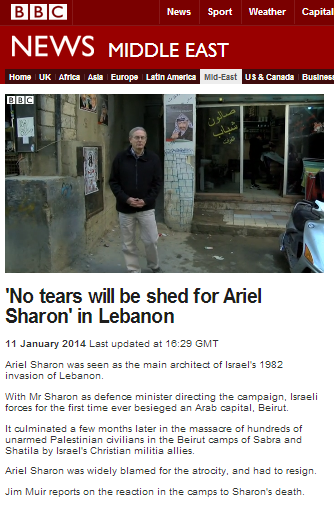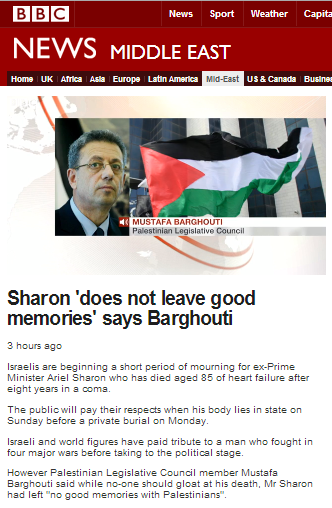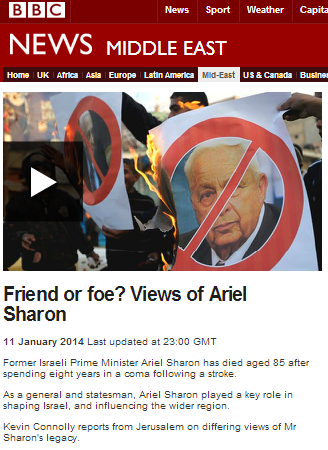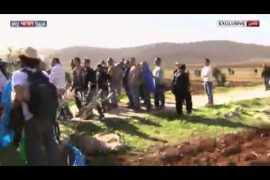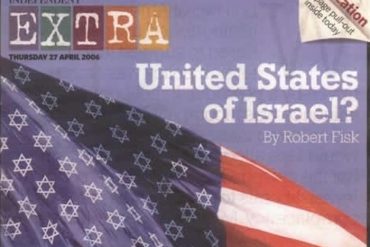One of the notable features of the BBC’s tsunami of coverage of Ariel Sharon’s death – and one which has already received no small amount of criticism on social media for its inappropriate lack of taste – has been the generous inclusion and amplification of hate-filled views of the man and his life.
On the live page which appeared on the BBC News website on January 11th immediately following the official announcement of Sharon’s death under the tacky heading “As it happened: Ariel Sharon dies“, the feed included the following. [all emphasis added]
“1446: Arab Twitter users were celebrating Sharon’s death within seconds of it being announced. Tweets in Arabic seen by the BBC recount what many see as Sharon’s crimes from the 1967 Arab-Israeli war through the occupation of Lebanon in 1982, to the storming of the al-Aqsa Mosque complex in 2000.
“Sharon is a shedder of blood, all the curses of the skies and the Earth are on him, he killed children and women, and displaced families,” read one tweet.
“There are many like Sharon in the school of the Zionists,” read another. “Like many before him he died, and the school of crimes survives.”
Many regretted Sharon had not stood trial. “I did not see him standing behind bars to be tried for the pain and harm he caused for the Palestinian people, but it is fate, yes fate,” wrote one.”
Is the phrase “storming of the al-Aqsa Mosque complex” really an accurate description of the events of September 28th 2000 in the eyes of the BBC?
“1504: Hamas, the Palestinian Islamist movement which controls the Gaza Strip, welcomed the departure of a “tyrant”. “Our people today feel extreme happiness at the death and departure of this criminal whose hands were smeared with the blood of our people and the blood of our leaders here and in exile,” said spokesman Sami Abu Zurhi.”
“1505: A former minister in the Palestinian Authority, Ghassan Khatib, has told BBC World Service that Palestinians will never forgive Ariel Sharon for what he did. “We all only have negative and bad memories of Sharon,” he said.
“I think the consensus among Palestinians is that Sharon needed to be treated as a war criminal more than anything else. In all his political life he was a leading figure in the Israeli political camp that worked by all possible means, legal and illegal, in order to maintain the illegal control of Israel over the Palestinians.” “
“1535: Few tears are being shed for Sharon in Egypt, if the blog posts seen by BBC Monitoring are anything to go by.
“Sharon died years ago, today he is being taken to the courtroom,” wrote well-known Egyptian actor and activist Nabil al-Halafawi on Twitter.
Khayri Ramadan, a prominent presenter on one of the most watched private channels in Egypt, CBC TV, tweeted: “The murderer Ariel Sharon. Sharon died and is thrown in the history’s dustbin because of his brutality, maltreatment of our brothers in Palestine and Lebanon.” “
“1620: In the Gaza refugee camp of Khan Younis, correspondents saw some people burning pictures of Sharon or stamping on them, while others distributed sweets to motorists and passers-by.”
“1627:

This image appeared on Iran’s Fars news agency with the caption “The story of the butcher of Sabra and Shatila is over”.”
“1652: Tawfik Tirawi served as Palestinian intelligence chief when Sharon was prime minister. His reaction to his death: “He wanted to erase the Palestinian people from the map… He wanted to kill us but, at the end of the day, Sharon is dead and the Palestinian people are alive.” “
“1658: BBC Monitoring has been watching Iranian media for their coverage of Sharon’s death. For the state TV of one of Israel’s greatest enemies, he was a “criminal Zionist racist” and “mastermind of the brutal massacre of more 3,300 oppressed Palestinians and refugees”. According to a presenter on the channel, Sharon “got involved in the genocide and occupation of Palestinian lands by enrolling in a Zionist group in his youth”.”
“1738: Palestinians who survived the 1982 Sabra and Shatila camp massacre in Beirut show no sympathy or compassion over Sharon’s death, Reuters news agency reports.
“I personally, as a witness and what I suffered from that person, I say to Hell and hellfire Sharon and similar to Sharon,” said one of them, Youssef Hamzeh.
“We have been suffering for the past 32 years, he suffered for only eight years,” said another, named as Milany Botros Alha Borje. “I wish he could for 10 more years so that I would be happy. There is nothing we can do. That’s God’s will.” “
For some inexplicable reason, official BBC Twitter accounts also saw fit to amplify and spread such hateful opinions.
 Similar comments were amplified – and also solicited – in BBC reports appearing on the BBC News website and on BBC television news programmes.
Similar comments were amplified – and also solicited – in BBC reports appearing on the BBC News website and on BBC television news programmes.
The BBC’s Jim Muir in Lebanon took the trouble of going to Shatila to gather comments from people there.
A recording of an interview with Mustafa Barghouti (presented only as a member of the PLC) which appeared on the BBC News website on January 12th was apparently taken from a telephone interview elsewhere, but its source is difficult to determine because the interviewer does not bother to intervene no matter how ridiculous Barghouti’s claims are or how many times BBC style guide rules are breached.
“And the most bad memory we have is – the worst memory – is that he practically undermined and destroyed the peace process – the Oslo process – when he visited Al Aqsa Mosque and launched a campaign against the implementation of the peace process, eventually building what has become the apartheid wall or the segregation wall that is confiscating and occupying big parts of the West Bank. And also he was responsible for the building of so many settlements – illegal Israeli settlements […] besides of course the fact that many people suspect that he was responsible for the assassination of Mr Arafat…”
A filmed report by Kevin Connolly from January 11th has a ‘man in the Gaza street’ interview and shows footage of pictures of Sharon being burned in Gaza and celebratory sweets being handed out.
An additional article from January 11th which appeared on the BBC News website is titled “Ariel Sharon death in Israel: World reaction“. That article features quotes from various Palestinian personalities and, notably, from the politically motivated NGO ‘Human Rights Watch‘.
“There was little sorrow among Palestinians at Ariel Sharon’s death, both in the West Bank and the Gaza Strip. At Khan Younis in Gaza, sweets were handed out and posters of the late Israeli prime minister was burned.
“We don’t say good riddance but I don’t think he has left us anything positive,” said Hanan Ashrawi, a member of the Palestinian Legislative Council. She told the BBC his legacy was one of violence, bloodshed and cruelty. Israel’s withdrawal from the Gaza Strip in 2005 was a “unilateral redeployment” that maintained a “very strict siege”.
Former minister Ghassan Khatib said “in all his history, he played a negative role” and a senior official in the Fatah movement, Jibril Rajoub, condemned him as a criminal whom Palestinians had wanted to see tried as a war criminal.
Khalil al-Haya of Gaza’s Islamist militant Hamas movement said after eight years Ariel Sharon was going in the same direction as “other tyrants and criminals whose hands were covered with Palestinian blood”.”
“The organisation Human Rights Watch said Ariel Sharon had died without facing justice for the massacre at Sabra and Shatila.”
Another article appearing on the BBC News website on January 12th saw fit to reproduce chosen quotes from the Middle East press such as the one below.
“Antar Farahat in Egypt’s privately-owned daily Al-Misri al-Yawm
His crimes and the massacres he committed against Palestinians and Arabs are witness to unprecedented racism and bloodiness… He has well-deserved the names of ‘Dracula’, ‘the Bulldozer’, ‘the hungry wolf’ and ‘war criminal’ and despite this his people regard him as a national hero in light of the achievements he made for them at the expense of Arab and Palestinian blood by taking part in all the wars Israel waged.”
But apparently the BBC policy of amplifying the hate-speech of anyone and everyone – from the Tweeter in the street to members of terrorist organisations and tame editors of newspapers from theocratic dictatorships – when statesmen and politicians pass away is selective. We certainly saw no evidence of such policy when Mandela recently died and it will be remembered that the BBC saw fit to censor a song about former British PM Margaret Thatcher at the time of her passing on the grounds that it was an inappropriate “celebration of death”.
One wonders how the licence fee-paying public would react if, when their time comes, former British statesmen were treated according to the version of those selective criteria deemed appropriate for a former Israeli Prime minister and their families exposed to BBC-sponsored tirades of hatred before they are even buried.


